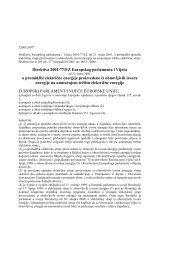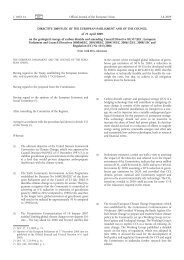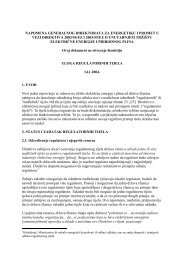Untitled
Untitled
Untitled
You also want an ePaper? Increase the reach of your titles
YUMPU automatically turns print PDFs into web optimized ePapers that Google loves.
dræava i njihovih odgovarajuÊih energetskih sektorai gospodarskih subjekata, koji su u spomenuteprocese i problematiku uπli ranije. S druge strane,prednost zemalja, njihovih energetskih sustava igospodarstava, dakako i njihovih regulatornih tijela,koji su procese otvaranja træiπta elektriËne energijei uvoappleenja novih oblika regulacije zapoËeli teknedavno, da mogu koristiti odgovarajuÊa iskustvazemalja u kojima su træiπta elektriËne energije uspostavljenai razvijena ranije, i kojima je regulacijauπla u viπe faze i razdoblja primjene, pri tom neponavljajuÊi njihove zablude i kriva rjeπenja.6) U pogledu regulacije energetskih djelatnostiprednost je dræava i ekonomija, ukljuËujuÊii energetski sektor, koji imaju dobro praÊenje iizvjeπtavanje o adekvatnim makroekonomskimgospodarskim parametrima, kao πto su interesne,odnosno kamatne stope na vlastiti kapitali zaduæenja, stope inflacije, premije na træiπnerizike, prinose od riziËnih i neriziËnih ulaganja,pokazatelje u svezi s prinosom dionica, premijeza træiπni rizik vlastitog kapitala itd. JednoznaËniprijenos i primjena navedenih parametara iz jednognacionalnog u drugi nacionalni energetskigospodarski sustav ili regulatorni okvir vrlo je dvojbeni prati ga niz pitanja i dvojbi. Tim viπe πtone samo da nema jednoznaËnih kriterija, nego sui vrlo razliËiti pristupi utvrappleivanju osnovica, npr.vrijednosti imovine i regulatorne osnovice, na kojese navedeni parametri primjenjuju. U tom kontekstui ciljani financijski pokazatelji, kao πto jeto npr. stopa povrata na imovinu ili pak garantiranivremenski rok povrata uloæenih sredstava, uposljednje vrijeme sve ËeπÊe postaju predmetompreispitivanja, nerijetko Ëak i vaæno politiËko pitanjena nacionalnoj razini. Naime, s navedenimpitanjima usko su povezani problemi novih investicijai ulaganja u elektroenergetske sustave, alii pitanja profita iz energetskih djelatnosti. Svakiod navedenih ekonomskih veliËina i parametaradakako ima svoj odraz u odgovarajuÊem utjecajuna ekonomiËnost poslovanja energetskog subjektai njegovu sposobnost da se dalje razvija.U okviru diskusije konstatirano je da bi bilo dobroi pragmatiËno da prve razvojne faze ekonomske regulacijeprate i relativno jednostavne regulacijskesheme tipa cost plus ili povrata sredstava, da binakon stjecanja odreappleenih iskustava i znanja uslijediorazvoj puno sloæenijih shema koje ukljuËujukombinacije tehniËkih i ekonomskih inicijativakoje kroz dugoroËni period trebaju osigurati sigurnoi stabilno financiranje rada i adekvatni razvojreguliranih energetskih subjekta, naroËito velikihmreænih infrastrukturnih sustava za prijenos i distribucijuelektriËne energije. OpÊi konaËni cilj jedakako sigurna opskrba elektriËnom energijom porealnoj, odnosno opravdanoj cijeni.auxiliary system services in the event that these arecovered by the corresponding regulatory framework.5) The Round Table Discussion clearly demonstratedthe superiority of the experience and solutions of theregulatory bodies, countries, energy sectors and economicentities which had addressed these processesand problems earlier. On the other hand, the countries,energy systems, economies and certainly regulatoryagencies that have only begun the processesof opening the electricity markets and introducingnew forms of regulations have the advantage of beingable to utilize the experiences and avoid repeatingthe past errors and inadequate solutions of the countriesin which the electricity markets have alreadybeen established and developed, and in which regulationshave entered advanced phases and periods ofapplication.6) In the regulation of energy activities, the governmentsand economies, including the energy sectors,that have good tracking and reporting of macroeconomicparameters such as interest rates on equityand debt, inflation rates, market risk premiums,yields from high-risk and low-risk investments, indicesin connection with stock market yields, equityriskpremiums etc. are at an advantage. The directtransfer and application of these parameters fromone national power system or regulatory frameworkto another is not practicable because a numberof issues and dilemmas are involved. This is evenmore the case because there are no uniform criteria.Instead, there are highly varied approaches for thedetermination of the bases, for example the assetvaluebase and regulatory base to which the givenparameters are applied.In this context, the target financial indices such asthe rate of return on assets or the guaranteed periodof return on investment have lately become subjectedto increasing scrutiny and are frequently animportant political issue at the national level. Closelyrelated to these issues are the problems of new investmentsin power systems, as well as the questionof profit from electricity activities. Each of theseeconomic measurements and parameters certainlyinfluence the cost-effectiveness of the operations ofentities and their ability to continue to develop.Within the framework of the discussion, it was concludedthat it would be good and pragmatic for thefirst development phases of economic regulationto accompany relatively simple regulation schemesof the “cost plus” or “return on assets” type. Afterexperience and knowledge are acquired, this shouldbe followed by the development of more complexschemes that include a combination of technical andeconomic initiatives, which over the long run shouldassure the secure and stable financing of operations545Klepo,M., Uloga regulatornih tijela u donošenju ..., Energija, god. 56(2007), br. 5., str. 526-553Klepo, M., The Role of the Regulatory Agency in Adoption ..., Energija, vol. 56(2007), No. 5, pp. 526-553
















